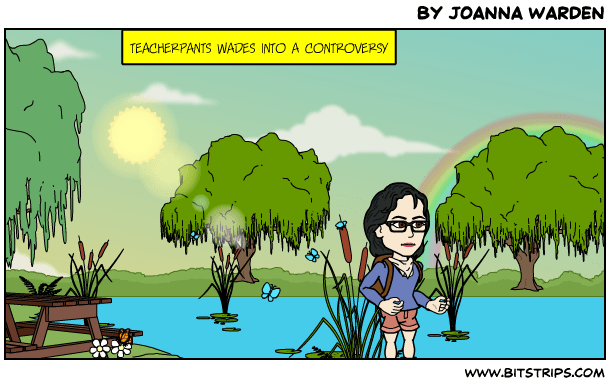
So, there’s been some talk here and here about the role of women in ELT. In a recent interview, Russell Mayne pointed to the latter article as the most important of his blogposts for that year. The two articles deal with the relatively low numbers of women in ELT management and as keynote speakers at conferences. Now while I’d like to respond with feminist outrage (some would say it’s my default setting), I have to admit that my experience of English language teaching has been a lot more nuanced. You see I come from the Toronto non-profit system, which is figuratively, and sometimes literally, a matriarchy.
It was pure Feminine Mystique… What? Haven’t read it? Here’s what the old me would have said:
Here’s a list of books. Take this away, and when you’ve finished all of them (yes! the Irigaray too! No skipping through the pre-Oedipal babble section!) then maybe we can have a conversation, but I still reserve the right to shout out, “What grounds do you have to say that? Have you ever given birth to a child?” at totally random moments. And yes I did do that and for that I am truly sorry.
The new me says, “Well, Friedan’s work is so cogent and logically consistent that I can summarize it in a few sentences.” (thank you, ifp, for forcing me to learn some practical academic skills!)
Friedan focuses on the group of women in 1940s and 50s US who took advantage of the new openness of the education system. They performed well in university and married equally well-educated husbands. After marriage, however, this balance disappeared. The men went on to careers commensurate with their academic performance while the women devoted themselves to their families. Friedan attributes this difference to two factors: the continuing sexism in most areas of the work force, and the prevalent value system, which presented motherhood as the exclusive path to feminine fulfilment. Friedan sees this discrepancy as a source of discontent and self-destructive behaviour. It’s a huge cultural trope — think Mother’s Little Helper;
think Diary of a Mad Housewife — hell, even early Family Circus cartoons allude to this.
So this was my mother’s world, and that of her friends. With good degrees from British and American universities, these women had followed their husbands to Toronto. They struggled with physical and cultural isolation in these large concrete suburbs. Their days were full: families were large in those days – four children was pretty average. But still, there wasn’t much social or academic stimulation. They might have been wondering just how they had ended up where they were.
So, they coped. Where their counterparts might have turned to barbiturates and key parties, they focused on volunteering. They started performing small jobs for larger organizations, the United Way, the Girl Guides,or the School Board, but many of them turned to language teaching. Toronto was starting to change, on its way to becoming the multicultural community it is now. Immigrants were moving in, and there was little support available for them. Small volunteer groups set up language classes in public libraries. These grew and eventually government funding was provided. Buildings were found to house these programs. Overland was one of the first.
Right from the start, the classes were set up to be student centred. There was a built-in understanding that the purpose was not merely language instruction but also a kind of cultural transformation. A new country meant a chance to re-invent oneself, and the learning centres sought to facilitate that.
Once, during my studies at OISE, I looked up from my copy of Pedagogy of the Oppressed, and asked my mother, “Did you all read Freire before you started? Did you plan from the outset for the school to turn out this way?” She looked at her earnest daughter with amusement. There had been no theory involved, she implied: they had just followed the dictates of common sense.
Wait! There’s more…

May 2, 2014 at 11:50 pm
Thank you for writing this! As a woman, as an English language teacher, as a Canadian, you are opening my eyes. Thank you. Now off to read part 2. 🙂
LikeLike
June 4, 2015 at 9:38 pm
Thanks for that read, Joanna! Sometimes I think we tend to over-theorize practices teaching and education purposes in general…but when look at from a place of necessity, it does seem like common sense. Kudos to the women of yore for paving a path for what we have today!
LikeLike